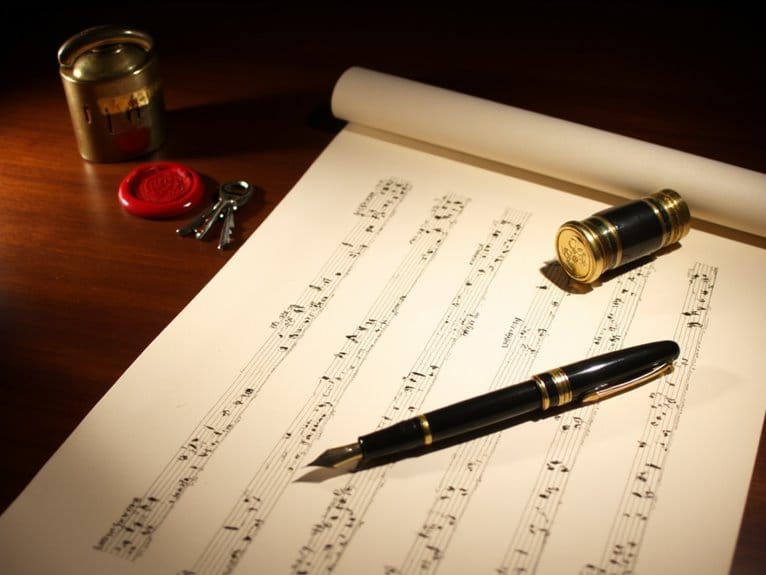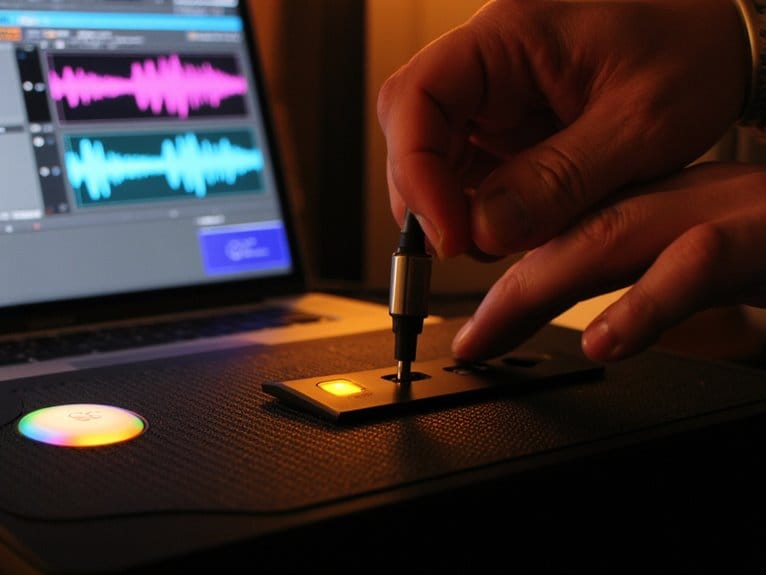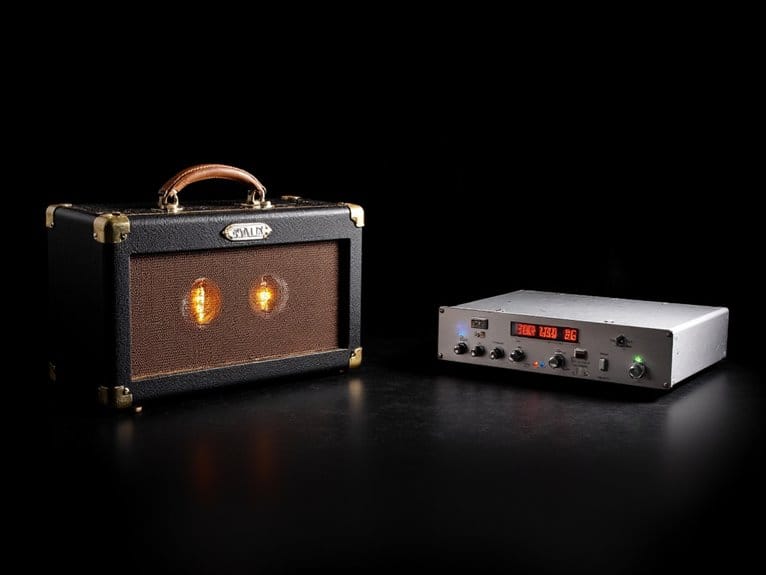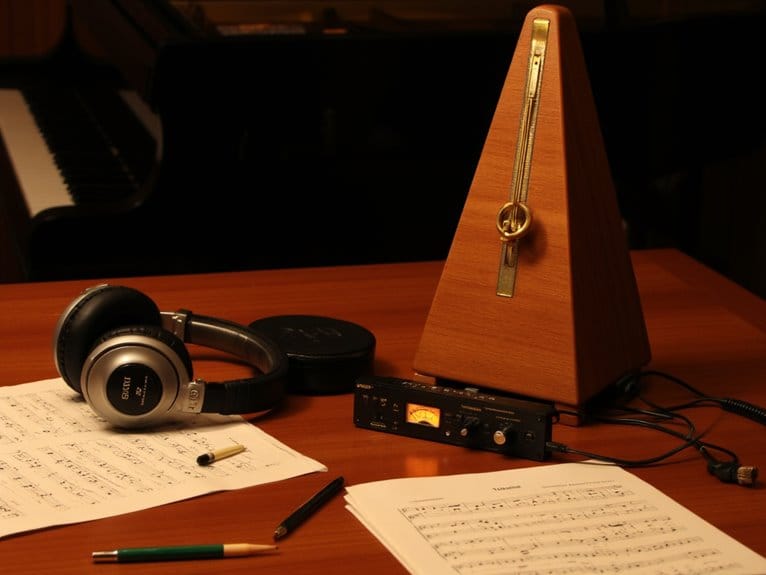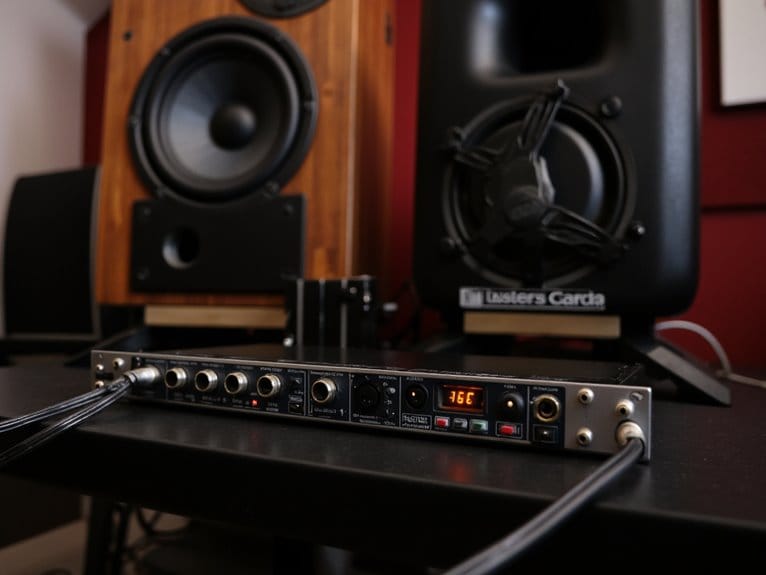Methods for Protecting Your Song Lyrics: A Legal Guide
Your song lyrics automatically receive copyright protection the moment you write, type, or record them, granting you exclusive rights to reproduce and distribute your work without any registration fees. While this basic protection exists, I’d recommend pursuing federal registration through copyright.gov’s “Works of the Performing Arts” section, which costs around $65 and provides enhanced legal standing for potential infringement lawsuits. You can also explore digital services like SongRegistration.com for streamlined alternatives, though maintaining detailed documentation with timestamps, witness statements, and controlled sharing protocols using NDAs creates the strongest defense foundation. Understanding these layered protection strategies reveals additional enforcement opportunities worth exploring.
We are supported by our audience. When you purchase through links on our site, we may earn an affiliate commission, at no extra cost for you. Learn more.
Notable Insights
- Song lyrics receive automatic copyright protection when written, recorded, or typed in any tangible form.
- Federal registration at copyright.gov provides enhanced legal protections and enables filing infringement lawsuits in federal court.
- Digital registration services like SongRegistration.com offer streamlined alternatives with immediate affidavits and encrypted data protection.
- Maintain detailed documentation including creation timestamps, witness statements, and controlled sharing protocols with NDAs and watermarks.
- Establish chronological creation logs and revision histories to prove original authorship in potential legal disputes.
Understanding Automatic Copyright Protection for Lyrics
While many songwriters assume they need to jump through legal hoops to protect their creative work, I’ve found that copyright law actually provides immediate protection the moment you put pen to paper or hit record.
Your lyrics gain automatic protection once they’re fixed in any tangible form, whether that’s scribbling verses on napkins, typing them into your phone, or recording a voice memo. This automatic protection grants you exclusive rights to reproduce, distribute, and perform your lyrics publicly, along with creating derivative works.
The copyright benefits kick in without registration fees or paperwork, though I’ll admit the enforcement capabilities remain somewhat limited without formal registration. However, registered copyright establishes your authorship on the public record and enables you to pursue legal action in federal court for copyright infringement.
Still, this immediate safeguard establishes your legal ownership and provides a foundation for protecting your creative expression from unauthorized use. Keep in mind that proving originality can be challenging despite this automatic protection, making proper documentation of your creative process essential for establishing authorship.
Federal Registration Through the U.S. Copyright Office
The robust protection that federal registration offers through the U.S. Copyright Office transforms your lyrics from basic copyright into a legal powerhouse, though I’ll admit the filing process initially seemed more challenging than writing my first chorus.
You’ll navigate to copyright.gov, create an account, and select “Works of the Performing Arts” for your application type. The Standard Application works for individual songs, while the Single Application suits solo songwriters who own their entire work.
Registration benefits include access to federal courts for infringement lawsuits, statutory damages eligibility, and establishing public ownership records. Federal registration provides additional legal protections beyond the automatic copyright protection that exists when your lyrics are first written down.
You’ll pay filing fees online, submit MP3 deposits of your work, and receive a mailed certificate upon completion, creating enforceable protection with stronger evidentiary weight. The registration review process typically takes several months before your certificate arrives, so patience becomes essential for completing your legal protection.
Digital Registration Services and Online Platforms
Beyond the official federal route, digital registration services have emerged as streamlined alternatives that simplify the copyright process, though I’ve learned they aren’t all created equal after testing several platforms myself.
In our digital age, services like SongRegistration.com offer immediate Registration Affidavits for $29.95, covering up to four songs with instant email confirmation, while Songrite International provides extensive protection including lyrics, arrangements, and artwork through their CR3 forms.
Easy Song Licensing bridges the gap by handling federal registration for $144 total, combining official U.S. Copyright Office filing with user-friendly service.
The registration advantages include instant proof of ownership, consolidated rights coverage, and simplified workflows that don’t require legal expertise, making protection accessible to independent creators. Most reputable platforms implement SSL technology to ensure your sensitive information remains encrypted during the submission process. These services typically offer protection for the creator’s lifetime plus an additional fifty years, establishing long-term security for your intellectual property.
Best Practices for Documentation and Enforcement
Once you’ve secured your copyright registration through digital services or federal filing, establishing robust documentation practices becomes your strongest defense against potential infringement. This is something I learned the hard way after encountering my first licensing dispute without proper records.
Proper lyric formatting using standard fonts like Times New Roman, combined with clear ownership clarification through dated signatures and contact information, creates an unshakeable foundation for your intellectual property claims. Professional formatting serves as your music resume, making a critical first impression when submitting to industry professionals who may later become witnesses to your ownership claims.
Your documentation strategy should include:
- Chronological creation logs that track every draft, revision, and collaboration agreement with timestamps and witness statements
- Controlled sharing protocols using NDAs and watermarked files when distributing lyrics to industry professionals
- Active monitoring systems with automated alerts for unauthorized use across digital platforms and licensing databases
These practices transform scattered creative work into legally defensible evidence. When documenting your lyrics, ensure that words reflect casual speech patterns rather than overly formal written language, as this authenticity can be crucial in proving original authorship during legal proceedings.
On a final note
You’ve got solid options for protecting your lyrics, from automatic copyright protection that kicks in the moment you create them, to federal registration that strengthens your legal position considerably. I’ve found that combining proper documentation with strategic registration gives you the best defense against infringement, though the process requires attention to detail and consistent record-keeping. Your creative work deserves protection, so don’t skip these essential steps.

